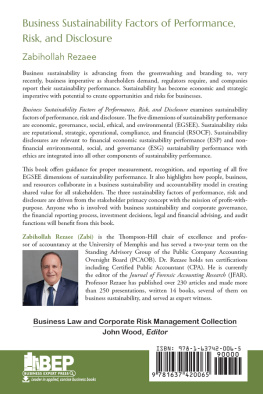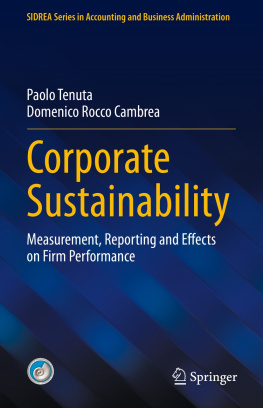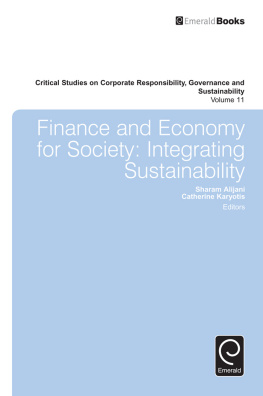Business Sustainability
Business Sustainability
Investor, Board, and Management Perspective
Zabihollah Rezaee
Contributing Author Nick J. Rezaee

Business Sustainability: Investor, Board, and Management Perspective
Copyright Business Expert Press, LLC, 2022.
Cover design by Charlene Kronstedt
Interior design by Exeter Premedia Services Private Ltd., Chennai, India
All rights reserved. No part of this publication may be reproduced, stored in a retrieval system, or transmitted in any form or by any meanselectronic, mechanical, photocopy, recording, or any other except for brief quotations, not to exceed 400 words, without the prior permission of the publisher.
First published in 2021 by
Business Expert Press, LLC
222 East 46th Street, New York, NY 10017
www.businessexpertpress.com
ISBN-13: 978-1-63742-101-7 (paperback)
ISBN-13: 978-1-63742-102-4 (e-book)
Business Expert Press Business Law and Corporate Risk Management Collection
Collection ISSN: 2333-6722 (print)
Collection ISSN: 2333-6730 (electronic)
First edition: 2021
10 9 8 7 6 5 4 3 2 1
Description
Business sustainability has become economic and strategic imperative with potential to create opportunities and risks for businesses. There have been considerable efforts by regulators and business organizations to encourage the board of directors and management to pursue profit-with-purpose goals in by focusing on long-term investment and integrating environmental, social and governance (ESG) sustainability into their strategic and investment decisions. The concept of impact investing, of focusing on the importance and relevance of corporate investment strategies in achieving financial economic sustainability performance (ESP) in creating returns on investment and in obtaining non-financial ESG sustainability performance of providing positive social and environment impacts, is gaining acceptance by retail and institutional investors. Positive effects on the environment and society cannot be achieved without allocating scarce resources that could otherwise be used to maximize firms financial economic performance. The role of the board of directors is to oversee the managerial function of focusing on the long-term financial ESP and non-financial ESG sustainability performance, effectively communicating sustainability performance information to all stakeholders.
This book examines the crucial role of investors both retail and institutional investors and investment managers, the corporate board of directors and management in collaborating to achieve financial ESP and nonfinancial ESG sustainability performance in creating shared value for all stakeholders. This book also highlights how people, business and resources collaborate in achieving sustainability performance of creating shared value for all stakeholders. Anyone who is involved with business sustainability and corporate governance will be interested in this book.
Keywords
business sustainability; financial economic sustainability performance; nonfinancial environmental, ethical, social, and governance sustainability performance; sustainability risk; sustainability disclosure; impact investing; investor interests in sustainability; board sustainability fiduciary duties; management sustainability commitments; supply chain sustainability
Contents
This book defines business sustainability as a process of generating financial economic sustainability performance (ESP) to create shareholder value while achieving nonfinancial environmental, ethical, social, and governance (EESG) sustainability performance in protecting the interests of other stakeholders including creditors, customers, employees, suppliers, government, society, and the environment. The primary purpose of sustainability is to create shared value for all stakeholders and as such corporate gatekeepers including investors, the board of directors, and management play an important role in continuously improving financial ESP and non-financial EESG sustainability performance toward achieving the main goal of creating shared value. Given the global growing attention to business sustainability, this book examines the emergence of business sustainability from investors, directors, and management perspective. The role of business corporations in our society has evolved from profit maximization to creating shareholder value and in recent years to create shared value for all stakeholders. Firm performance is measured not only by financial income, but also by the mechanisms in which business success and sustainability is measured in terms of nonfinancial sustainability key performance indicators pertaining to environmental, social, governance, and ethical activities.
Business sustainability enables management to establish synergy and congruence between the two managerial concepts of cost management and performance management, and integrate sustainability into the business environment, corporate culture, and supply chain processes. Cost management and performance management practices have recently received considerable attention in management and financial accounting and the business community. Cost management is defined in the context of enterprise sustainability as a process of planning and controlling the costs of products and services to promote maximum utilization of scarce resources in generating revenue and delivering high-quality and environmentally safe products and services to customers. Performance management, in the context of sustainability, consists of all business activities that generate financial ESP and non-financial EESG sustainability performance to maximize firm value and create shared value for all stakeholders. This book addresses the integrated effects of both economic factors and managerial incentives on cost behavior and sustainability performance. This book attempts to build a bridge between managerial accounting and financial accounting by focusing on both internal information systems (cost management) and external information systems (performance management), as these two functions are interrelated and integrated. This book provides insights into managerial initiatives for advancing business sustainability from greenwashing and business branding to creating opportunities for revenue generation, cost management, supply chain, business growth, and products and services innovation. The integrated cost management and performance management concepts under business sustainability suggest that a firm must extend its focus beyond maximizing short-term shareholder profit by considering the impact of its operations on the long-term interests of all stakeholders, including shareholders, creditors, customers, employees, the community, society, and the environment.
This book consists of five chapters covering all aspects of business sustainability with a keen focus on its implications for investors, boards of directors, and management. Anyone who is involved with business sustainability and corporate governance, the financial reporting process, investment decisions, legal and financial advising, audit functions, and corporate governance education will be interested in this book. Specifically, corporations, their executives, the boards of directors, board committees, internal and external auditors, accountants, lawmakers, regulators, standard-setters, users of financial statements (investors, creditors, and pensioners), investor activists, business schools, and other professionals (attorneys, financial analysts, and bankers) will benefit from this book. Business sustainability structure including principles, theories, risks, performance, mechanisms and functions presented in this book are applicable to organizations of all types and size. Profit-oriented, not-forprofit, and governmental entities can benefit from the book. We hope you find this book useful and valuable in achieving your personal and professional goals. The book provides maximum flexibility in presenting the amount and order of materials on business sustainability.












